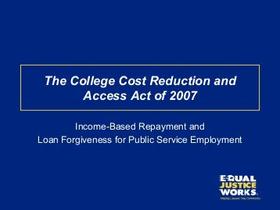Although community colleges are significantly more affordable than four-year institutions, tuition, administration fees, living costs, and book expenses can add up quickly. Unfortunately, according to 2008 research conducted by the Project on Student Debt, one out of 10 community college students cannot access federal student loans. For these students, Pell Grants often become the primary source of education funding.
However, if your community college offers federal student loans – which the majority of large, public, non-rural campuses do – then you may want to consider federal work-study (FWS) programs, which are also known as Formula Grants.
Unlike other forms of financial aid that are strictly given as grants and loans, the work-study program helps fund your education through your working efforts. The federal government provides your community college with specific grants, and then your campus works with community and nonprofit organizations to create job opportunities for qualified students. You are paid an hourly wage for your work, which is typically higher than the minimum wage.
The advantages of work-study programs
Garnering real-life experience
Attending community college prepares you for the real world, and with a work-study program, you can take that preparation to the next level. Due to the supply of work-study jobs, you are essentially “guaranteed” a job if you qualify for the FWS program. Due to employers' significant incentives, you are more likely to be hired for your job of choice under the FWS program.
Graduating from college with a degree is no longer sufficient for garnering an ideal job. As the economy becomes more competitive, it is important that your employment candidacy has an edge in the pool of job applicants. Through the work-study program, you can garner real-life experience and build your resume, which will benefit your professional career. It also demonstrates that you can the ability to effectively manage the responsibilities of working and attending school simultaneously.
You will also develop a professional relationship with your FWS supervisor, meaning that you can add a work reference to your resume. This continues to enhance your ability to obtain the job of your choice upon graduation.
This video discusses federal work-study, which is a type of financial aid for colleges in the United States.
Greater work flexibility
With an FWS job, your employer will understand that you are a community college student and, therefore, will most likely be flexible in scheduling your work based on your school schedule. This may not apply to jobs that are outside of the FWS program, as employers have no incentive to hire a community college student in contrast to other job applicants. Therefore, they may be more stringent upon your working schedule without considering your class schedule.
Also, remember that, unlike standard jobs, your income from the FWS program is not counted against your eligibility for future financial aid. Although the earnings are taxed, you can still qualify for other forms of government financial aid.
Giving back to your community
The beauty of a federal work-study program is that you can earn the funding for your education while giving back to the community through your campus or non-profit organizations.
With financial aid funding, your community college will pay for most of your wages. This allows you to garner real-life experience while the nonprofit organization benefits from only paying a fraction of what standard wages would cost. Therefore, whereas a nonprofit organization may not normally afford talented employees, they can under the work-study program – allowing you to contribute your skills to the cause that calls to you.
There are also many opportunities to give back directly to your community. Working with younger students in tutoring environments is a prevalent and popular FWS program, and this simultaneously helps you hone your knowledge base in your major or specialization.
You can also choose from an abundance of on-campus positions, eliminating any time you would spend commuting. Different positions and departments are available, allowing you to tailor your work to your academic interests.
No repayment of the loan
Unlike financial aid in the form of loans, there is no money to repay with the FWS program. You do not have to incur interest on your educational loans, but instead, you can pay for your education debt-free, or at least with lower levels of student debt.
The drawbacks of work-study programs
Restricted working hours
Since the program is designed for part-time work, you have a Maximum Earnings Level determined by your individual financial need. Therefore, once you reach your Maximum Earnings Level, you cannot continue working under the work-study program for that quarter, semester, or year.
Whereas each community college campus has its own requirements, you can typically work up to a maximum of 20 hours per week when classes are in session and 40 hours during summer and school breaks. Although the maximum is determined by personal financial need, most students, on average, work anywhere from 10 – 15 hours per week.
Limited working schedules
If you take a work-study position on campus, you will most likely not have work during vacation breaks or the summer. Therefore, if you rely upon this income significantly, the limited hours during these timeframes can be detrimental. It will be hard for you to earn extra money during your holiday breaks if you work on campus. However, you can always opt to choose an off-campus FWS position, which will most likely not share the same scheduling issues as an on-campus position.
Non-competitive wages
Depending upon the specific position and organization, some FWS program positions may not offer wages that are competitive with the job market. Therefore, you may earn less per hour with the FWS program than with a traditional job. However, you must determine if the benefits – primarily that the FWS income does not count against your future financial awards – outweigh the lower wages.
On the other hand, there are indeed positions that pay competitive wages comparable to the current job market environment.
Do you qualify?
To qualify for a federal work-study program, you must submit your FAFSA and meet certain requirements as designated by the government and your individual community college.
According to the US Department of Education, the value of your FWS award depends upon three factors:
- Your application timing – Remember, with financial aid, the process is based upon a “first come, first serve” philosophy. The earlier you send in your FAFSA, the more money is available for awards.
- Your financial need – This determines your maximum earning amount with the FWS program.
- Your school’s funding abilities – Each school is allocated a certain amount of funds for the FWS program. Based on their funding allocations, your FWS award is impacted.
If you are unable to maintain a satisfactory GPA or if you obtain financial funding from other sources, your eligibility for the work-study program may be waived.
This video offers some tips for exploring work-study programs.
Generally, an FWS program can be very advantageous in funding your community college tuition. With flexible employer schedules, income that does not count towards your future financial awards, and an ability to garner great real-life experience, the FWS program offers both academic and professional benefits.
Questions? Contact us on Facebook. @communitycollegereview















